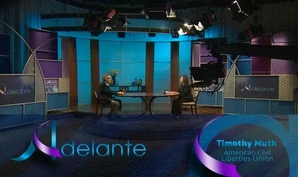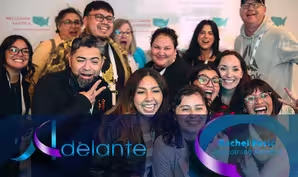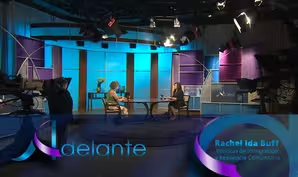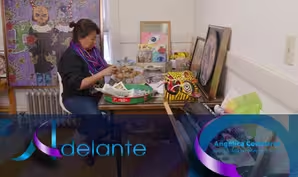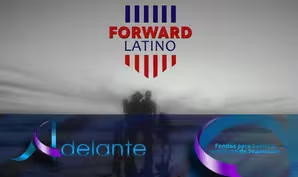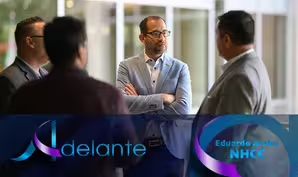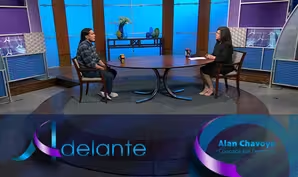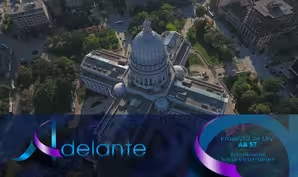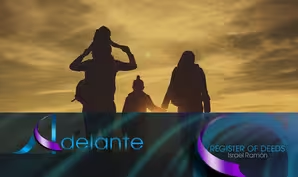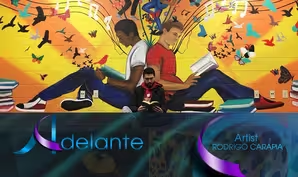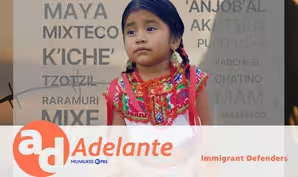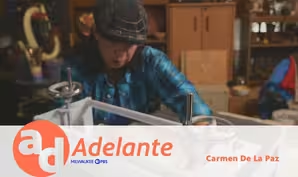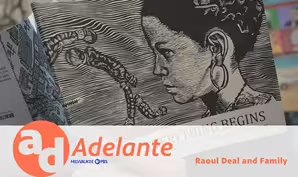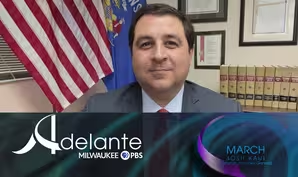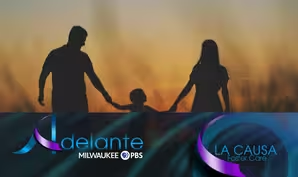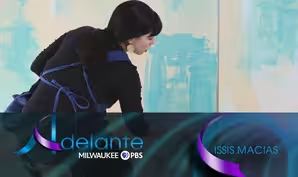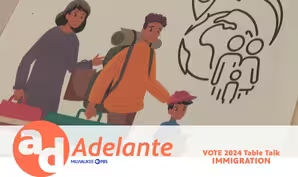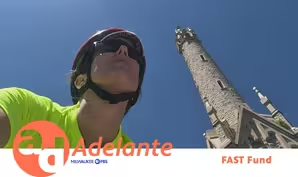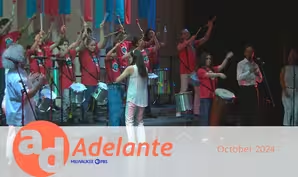Adelante
Rachel Ida Buff, Lessons that families at risk of deportation can learn
Clip: Season 26 | 10m 19sVideo has Closed Captions
Dr. Rachel Ida Bluff is with us to discuss lessons that families at risk of deportation can learn.
As the federal administration continues to fulfill its promise to deport undocumented immigrants, intellectual sectors and millions of immigrant advocates are uniting in massive protests. Dr. Rachel Ida Bluff is with us to discuss the lessons that families at risk of deportation can learn to overcome the hostile conditions they are facing.
Problems playing video? | Closed Captioning Feedback
Problems playing video? | Closed Captioning Feedback
Adelante is a local public television program presented by MILWAUKEE PBS
This program is made possible in part by the following sponsors: Johnson Controls
Adelante
Rachel Ida Buff, Lessons that families at risk of deportation can learn
Clip: Season 26 | 10m 19sVideo has Closed Captions
As the federal administration continues to fulfill its promise to deport undocumented immigrants, intellectual sectors and millions of immigrant advocates are uniting in massive protests. Dr. Rachel Ida Bluff is with us to discuss the lessons that families at risk of deportation can learn to overcome the hostile conditions they are facing.
Problems playing video? | Closed Captioning Feedback
How to Watch Adelante
Adelante is available to stream on pbs.org and the free PBS App, available on iPhone, Apple TV, Android TV, Android smartphones, Amazon Fire TV, Amazon Fire Tablet, Roku, Samsung Smart TV, and Vizio.
Providing Support for PBS.org
Learn Moreabout PBS online sponsorshipYESSENIA RUANO: Mi hijo tiene cinco años.
Él no sabe lo que está pasando.
RACHEL IDA BUFF: What we're seeing now is unprecedented in scale and I would say brutality, but certainly there's been a build-up over the course of the 20th century.
So if we start with Bisbee, Arizona, in 1917 there was a mine and there were workers from Mexico, from United Kingdom, from Europe who went out on strike.
Kind of it's the first mass deportation in American history.
And what the mine owners did is they collaborated with the sheriff and they brought in trains with freight cars and they just forced people to get in.
And then they loaded them onto the trains and then the train drove out of town and unloaded them.
At different times throughout the 20th century we could think about Operation Wetback, so-called, which was an attempt to rid the southwestern California of the so-called Wetback Menace, which was really targeting Mexican Americans, of course.
It was a really racist campaign.
Similarly there, the immigration and naturalization service would round people up.
Citizens, legal residents, undocumented people, detain them and then deport them across the border.
It's really important to say that 99% of the people in immigrant detention have committed no crime.
They are just here.
And somehow, and this happened in the 1980s in the early Reagan years, as Haitians tried to migrate, the United States responded by trying to pluck them at sea and dump them back in Port-au-Prince, even if you were fleeing for your life, even if somebody was trying to kill you, dump them back in Port-au-Prince.
But some people, some Haitians, made it in leaky boats to Florida and the Reagan administration did not know what to do with these black folks seeking freedom.
So it decided, this is where we have the beginning of the idea that to seek asylum, an international right certified in 1951 in this country, and it's radiated to other countries in the global north, if you are an asylum seeker and you need to leave home because it's unsafe, you will be preemptively detained.
You will go to prison for the crime of having to flee your home.
And now we see the scale of that, right?
The problem with that, it's unconstitutional, it violates international law, it's cruel and despicable, and also it is very, very lucrative.
The people who run the for-profit immigration jails, they are bipartisan donors.
Sometimes people are like, well, why was Obama a liberal Democrat, the deporter in chief?
Like, those people are giving money to Democrats, they give money to Republicans.
You know, Biden ensured that there would be an expansion of beds, and those beds will be filled because Mr. G4S, Mr. CoreCivic, all those people, they need, they need, they need the money.
As a Jewish person and an immigrant rights activist, we often think about the concentration camps, and I think that that metaphor and that language is important here.
But when I think about CECOT, the big prison in El Salvador, that we pay millions of dollars to house innocent people.
I think we have to think about the founding of the United States in slavery, and the kind of conditions of having no rights and no regard for your physical comfort or being able to keep your family together.
The origins of that are in what founded and built this country, which is enslavement.
There's no other way to think about it.
I think that increasingly.
PATRICIA GÓMEZ: What do you see on the other side that can be good for those who are at the highest risk of being deported with no due process and probably in a violent way?
RACHEL IDA BUFF: Yeah, we can talk about the brutality, which is real, and the cruelty, which is real, and it can feel just overwhelming and terrifying.
And that's the intent.
We're all supposed to be scared.
Immigrants are supposed to be too terrified to leave the house.
That's what they want.
Alligator Alcatraz is to scare people.
This is a campaign of terror.
And I will say about the immigrant rights movement in general, and Voces de la Frontera in particular, that we cannot underestimate the power and beauty of people getting together and deciding that we want our city, our state, our county to look different.
You know, when I said that the 287(g) program, which comes out of a terrible immigration law that passed in 1996 and mandates that police cooperate with immigration enforcement, we don't have that in Milwaukee because Voces fought it.
This was in 2019.
There was a family that was getting ready for school, and they were pulling out to take their kids to school, the mom and the dad and the two kids, and ICE and the MPD pulled up and blocked the car and took the dad, who was taken to detention without his medication, his daughters screaming and crying.
Sometimes people don't even know where their folks are taken.
But watching these folks turn into spokespeople, turn into people who are valued and embraced by their community, that is transformative.
That is why the cops do not collaborate with ICE in our city.
It's because the people of the city said no.
And mostly it was Latino and immigrant people, but also it was people like me who said, you know, I don't want to live in a city like that.
We saw it with Yessenia Ruano earlier this year, the El Salvadoran very beloved teacher in our community, was on a very cold morning when she went for her immigration check-in in January, and we thought she would be taken.
She said goodbye to her daughters, and she went in and she came out.
And I will never forget that moment of her coming out, because we didn't think she would.
Her daughters were crying.
We were all crying.
Eventually, though she fought a good fight and we fought with her, she was, took voluntary departure, she deported herself to El Salvador with her daughters, because she was afraid of being taken from them, and she...
They didn't give her enough time to make her visa.
Voces has an emergency hotline, so when there's reports of ICE on South 16th Street, people call and then we send people out to verify.
Anyone can train to be a verifier, you know, and we need people all over the state verifying rumors of raids so we know what to expect.
And then other people, usually people who are citizens and are less at risk, go out to do defense and protection.
And something that doesn't get covered enough in the news, when I was getting ready for this today, I was looking at footage from Tucson a couple of weeks ago when ICE showed up and hundreds of people from the community came out.
And those people, you know how sometimes you go in, not in my kitchen, but in some people's kitchen, you go in and you turn the lights and there are bugs that scurry away?
That's ICE.
They don't do well in the light.
They don't do well when the public is saying, "What are you doing?
Where are you taking them?
Stop it."
And there have been many, many examples of citizens turning out and trying to stop and sometimes succeeding in stopping a deportation or limiting how many people are taken.
Never, if there's an ICE agent at the door, never let them in.
They will say anything, including lying, only let them in if they have a signed judicial warrant.
And if they say, "Well, we're going to show it to you if you open the door," have them slide it under.
And when people know that, that is your right.
It doesn't matter if you're a citizen.
It doesn't matter if you're undocumented.
It doesn't matter if you've boosted a car in high school and are ashamed of it or whatever.
They cannot get into your house.
They cannot talk to you without a signed judicial warrant.
When people know that, it changes the game.
PATRICIA GÓMEZ: Is there something else that people need to uplift them?
Because the conditions that they are facing are real threats.
RACHEL IDA BUFF: I think that what I can say to uplift those folks is, this is a terrible time.
This government came in promising cruelty.
And I don't think even some of the people who voted for that were prepared for how terrible it is.
And I think most of us don't want to have a dictatorship.
If you look at the leadership of our country, the president is close to the worst leaders on the planet.
You know, in El Salvador, in Israel, in Turkey, in Hungary.
He likes the dictators because he's studying them because that's what he wants to do.
Most Americans across the board don't want that.
And many of us who aren't indigenous were immigrants ourselves, right?
So we have that part of our histories.
You know, when we've seen these No Kings Days and these big marches, the huge marches we've had in Milwaukee for immigrant rights, for free Palestine, I think we're seeing awakening.
And I think that's really good.
[music]
Video has Closed Captions
Clip: S26 | 9m 3s | How Wisconsin Law Enforcement is Cooperating with ICE (9m 3s)
Rachel Peric - Welcoming America
Video has Closed Captions
Clip: S26 | 9m 53s | Welcoming America plays a crucial in building bridges and creating environments that thrive. (9m 53s)
Rachel Ida Buff, Lessons that families at risk of deportation can learn
Video has Closed Captions
Clip: S26 | 10m 19s | Dr. Rachel Ida Bluff is with us to discuss lessons that families at risk of deportation can learn. (10m 19s)
Mexican Artist Angélica Contreras transforms canvas
Video has Closed Captions
Clip: S26 | 5m 43s | From her studio in Madison, Wisconsin, Mexican artist Angélica Contreras transforms the canvas (5m 43s)
Forward Latino Fondos para Familias
Video has Closed Captions
Clip: S26 | 6m 42s | The City of Milwaukee awarded $100,000 to Forward Latino as part of an effort to support families (6m 42s)
Video has Closed Captions
Clip: S26 | 7m 9s | NHCC addresses the critical need for Hispanic representation in corporate leadership. (7m 9s)
Camino a la Libertad - Alan Chavoya
Video has Closed Captions
Clip: S26 | 6m 36s | Alan Chavoya, Professor of Philosophy, informing undocumented families about legal and human rights. (6m 36s)
Video has Closed Captions
Clip: S26 | 8m 59s | The debate over cooperation between local authorities and federal immigration agencies. (8m 59s)
Video has Closed Captions
Clip: S26 | 9m 12s | From the Office of the Register of Deeds, attorney Israel Ramón talks about the services his office (9m 12s)
Video has Closed Captions
Clip: S26 | 5m 37s | Rodrigo Carapia brings a gift to children and young people in schools and correctional facilities. (5m 37s)
Video has Closed Captions
Clip: S26 | 5m 25s | Margaret Cargioli, Director of Policy and Advocacy at the Immigrant Defenders Law Center (5m 25s)
Video has Closed Captions
Clip: S26 | 10m | Carmen de la Paz was in charge of the Waukesha Strong Tile Project. (10m)
Video has Closed Captions
Clip: S26 | 7m 52s | Continuum is an exhibition presented in honor of the work of Raoul Deal. (7m 52s)
Wisconsin State Attorney General Josh Kaul Full Interview
Video has Closed Captions
Clip: S26 Ep6 | 17m 57s | Full interview with State AG Josh Kaul (17m 57s)
Video has Closed Captions
Clip: S26 Ep6 | 5m 14s | Karen Steinbach of La Causa talks about the foster care program offered by this organization. (5m 14s)
Discover the art and career of Issis Macias
Video has Closed Captions
Clip: S26 Ep6 | 9m 52s | Discover with us the art and career of Issis Macias (9m 52s)
Artist Congh López, originally from Oaxaca
Video has Closed Captions
Clip: S26 Ep5 | 6m 21s | Artist Congh López, originally from Oaxaca, invites us to discover his artistic techniques. (6m 21s)
Vote 2024 Table Talk on Immigration
Video has Closed Captions
Clip: S26 Ep1 | 9m 57s | 4th part of the series “Vote 2024 Table Talk” - focus on Immigration (9m 57s)
Video has Closed Captions
Clip: S26 Ep1 | 7m 55s | Local 212 MATC Fast Fund is a non-profit organization that provides assistance to MATC students. (7m 55s)
Video has Closed Captions
Clip: S26 Ep1 | 6m 5s | Bembé Drum and Dance is a community-based cultural organization that promotes intergenerational art (6m 5s)
Providing Support for PBS.org
Learn Moreabout PBS online sponsorshipSupport for PBS provided by:
Adelante is a local public television program presented by MILWAUKEE PBS
This program is made possible in part by the following sponsors: Johnson Controls
